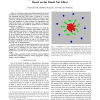1091 search results - page 5 / 219 » Swarming to rank for information retrieval |
IROS
2009
IEEE
14 years 2 months ago
2009
IEEE
— We study a simple algorithm inspired by the Brazil nut effect for achieving segregation in a swarm of mobile robots. The algorithm lets each robot mimic a particle of a certain...
ECIR
2009
Springer
14 years 4 months ago
2009
Springer
Probabilistic retrieval models usually rank documents based on a scalar quantity. However, such models lack any estimate for the uncertainty associated with a document’s rank. Fu...
SIGIR
2011
ACM
12 years 10 months ago
2011
ACM
Learning to rank represents a category of effective ranking methods for information retrieval. While the primary concern of existing research has been accuracy, learning efficien...
TREC
2004
13 years 9 months ago
2004
: In this paper, we report our experiments in the mixed query task of the Web track for TREC 2004. We deal with the problem of ranking Web documents within a multicriteria framewor...
SIGIR
2004
ACM
14 years 1 months ago
2004
ACM
Indexing and ranking are two key factors for efficient and effective XML information retrieval. Inappropriate indexing may result in false negatives and false positives, and impro...

